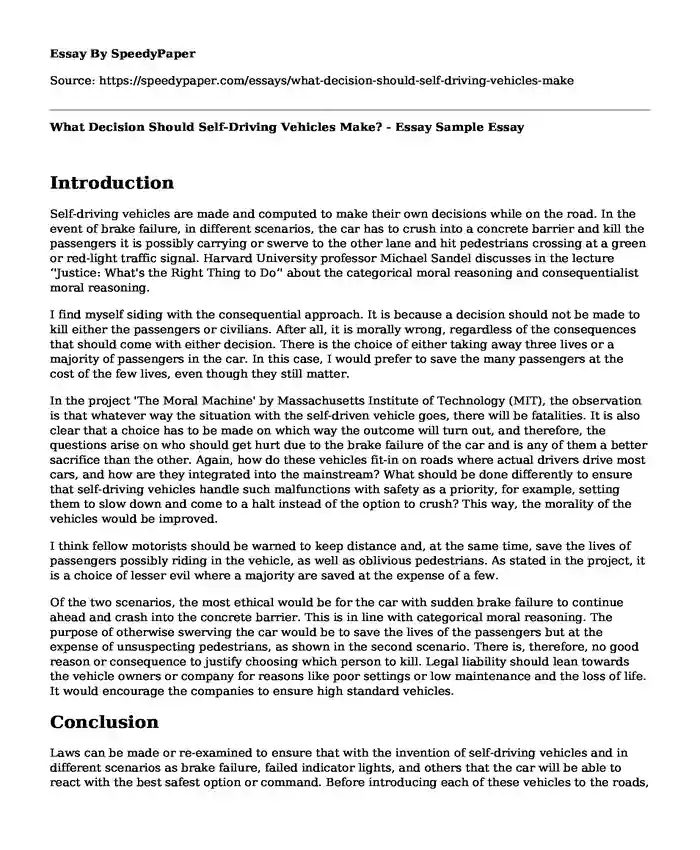
| Type of paper: | Essay |
| Categories: | Law Technology Artificial intelligence |
| Pages: | 3 |
| Wordcount: | 552 words |
Introduction
Self-driving vehicles are made and computed to make their own decisions while on the road. In the event of brake failure, in different scenarios, the car has to crush into a concrete barrier and kill the passengers it is possibly carrying or swerve to the other lane and hit pedestrians crossing at a green or red-light traffic signal. Harvard University professor Michael Sandel discusses in the lecture ‘'Justice: What's the Right Thing to Do’' about the categorical moral reasoning and consequentialist moral reasoning.
I find myself siding with the consequential approach. It is because a decision should not be made to kill either the passengers or civilians. After all, it is morally wrong, regardless of the consequences that should come with either decision. There is the choice of either taking away three lives or a majority of passengers in the car. In this case, I would prefer to save the many passengers at the cost of the few lives, even though they still matter.
In the project 'The Moral Machine' by Massachusetts Institute of Technology (MIT), the observation is that whatever way the situation with the self-driven vehicle goes, there will be fatalities. It is also clear that a choice has to be made on which way the outcome will turn out, and therefore, the questions arise on who should get hurt due to the brake failure of the car and is any of them a better sacrifice than the other. Again, how do these vehicles fit-in on roads where actual drivers drive most cars, and how are they integrated into the mainstream? What should be done differently to ensure that self-driving vehicles handle such malfunctions with safety as a priority, for example, setting them to slow down and come to a halt instead of the option to crush? This way, the morality of the vehicles would be improved.
I think fellow motorists should be warned to keep distance and, at the same time, save the lives of passengers possibly riding in the vehicle, as well as oblivious pedestrians. As stated in the project, it is a choice of lesser evil where a majority are saved at the expense of a few.
Of the two scenarios, the most ethical would be for the car with sudden brake failure to continue ahead and crash into the concrete barrier. This is in line with categorical moral reasoning. The purpose of otherwise swerving the car would be to save the lives of the passengers but at the expense of unsuspecting pedestrians, as shown in the second scenario. There is, therefore, no good reason or consequence to justify choosing which person to kill. Legal liability should lean towards the vehicle owners or company for reasons like poor settings or low maintenance and the loss of life. It would encourage the companies to ensure high standard vehicles.
Conclusion
Laws can be made or re-examined to ensure that with the invention of self-driving vehicles and in different scenarios as brake failure, failed indicator lights, and others that the car will be able to react with the best safest option or command. Before introducing each of these vehicles to the roads, laws should state for due process to be followed in ensuring their company settings pass the recommended standards to render them acceptable for way and passenger use.
Cite this page
What Decision Should Self-Driving Vehicles Make? - Essay Sample. (2023, Sep 15). Retrieved from https://speedypaper.com/essays/what-decision-should-self-driving-vehicles-make
Request Removal
If you are the original author of this essay and no longer wish to have it published on the SpeedyPaper website, please click below to request its removal:
- Methods of Policing, Free Essay Example
- The Adoption of the EMR: Practice Fusion Assignment, Free Example for You
- Essay on Navigating Overtime Compensation: A Legal Analysis Under the Fair Labor Standards Act
- Ethical Issues Surrounding Covid-19: Safety vs. Rights - Essay Sample
- Free Essay Sample on Contrasting Assumptions of Classical and Positive Criminology
- Free Essay Sample: Islamic Banking
- Report Example on Probation Through Time: Evolution from John Howard to Modern Practices
Popular categories




